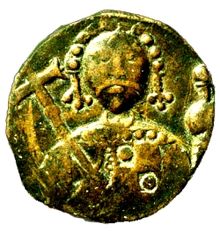Robert Guiscard
| Robert Guiscard de Hauteville | |
|---|---|

Coin of Robert Guiscard
|
|
| Spouse(s) |
Alberada of Buonalbergo Sikelgaita |
| Issue | |
| Noble family | Hauteville family |
| Father | Tancred of Hauteville |
| Mother | Fressenda |
| Born | c. 1015 |
| Died | 17 July 1085 (aged 70) Atheras, north of Lixouri |
| Buried | Abbey of the Santissima Trinità, Venosa |
Robert Guiscard (c. 1015 – 17 July 1085) was a Norman adventurer remembered for the conquest of southern Italy and Sicily. Robert was born into the Hauteville family in Normandy, went on to become Count of Apulia and Calabria (1057–1059), and then Duke of Apulia and Calabria and Duke of Sicily (1059–1085).
His sobriquet, in contemporary Latin Viscardus and Old French Viscart, is often rendered "the Resourceful", "the Cunning", "the Wily", "the Fox", or "the Weasel". In Italian sources he is often Roberto il Guiscardo or Roberto d'Altavilla (from Robert de Hauteville).
From 999 to 1042 the Normans in Italy, coming first as pilgrims, were mainly mercenaries serving at various times the Byzantines and a number of Lombard nobles. The first of the independent Norman Lords was Rainulf Drengot who established himself in the fortress of Aversa becoming Count of Aversa and Duke of Gaeta.
In 1038 there arrived William Iron-Arm and Drogo, the two eldest sons of Tancred of Hauteville, a petty noble of the Cotentin in Normandy. The two joined in the revolt of the Lombards against Byzantine control of Apulia. By 1040 the Byzantines had lost most of that province. In 1042 Melfi was chosen as the Norman capital, and in September of that year the Normans elected as their count William Iron-Arm, who was succeeded in turn by his brothers Drogo, Comes Normannorum totius Apuliæ e Calabriæ ("the Count of all Normans in Apulia and Calabria"), and Humphrey, who arrived about 1044.
...
Wikipedia
